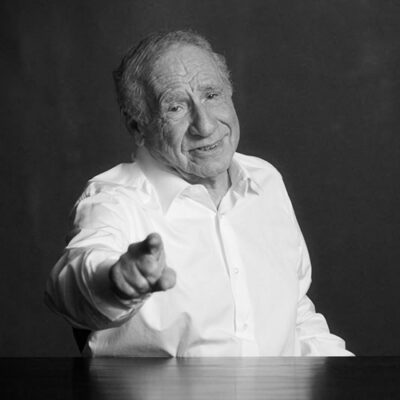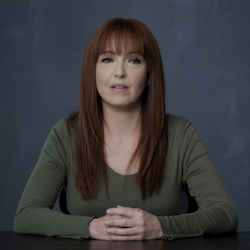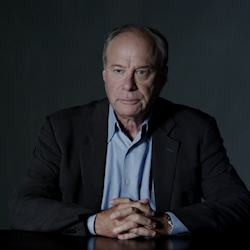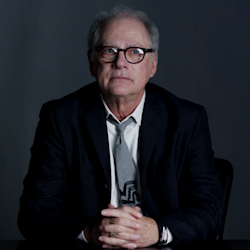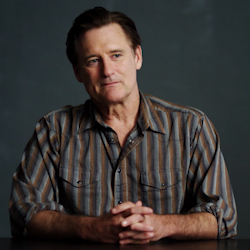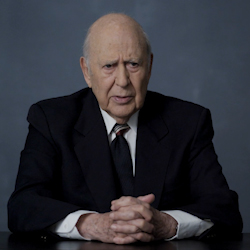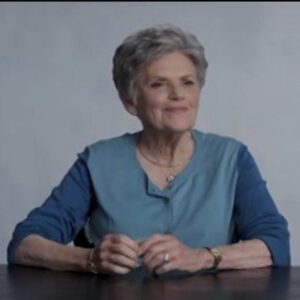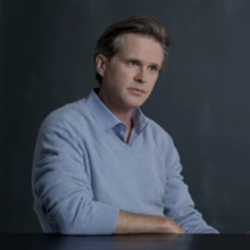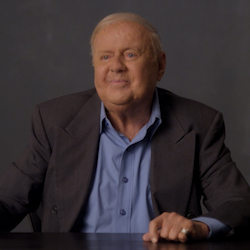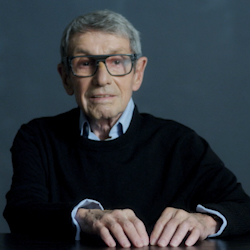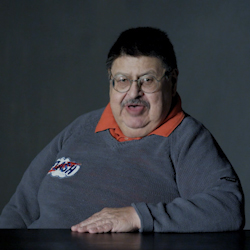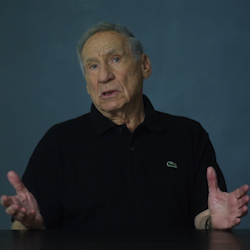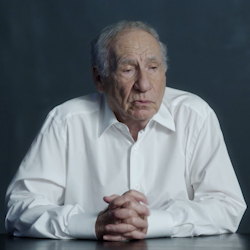Interviewer: So on on Dracula didn’t loving it, you had to audition?
Steven Weber: Yeah.
Interviewer: Tell us what you remember auditioning for Mel.
Steven Weber: Uh, I never met Mel Brooks and even more than the material itself, uh, which arguably was funny or not, I guess I have this opportunity to audition for the great man himself. And he was in that. And Culver Studios, I want to say, and. And I prepared for it, and it required an English accent, which I still have trouble with, and I walked into the office and I heard him before I saw him because he was in an adjoining room. I was in a kind of waiting room and I could even see. And it was almost like a Roman Polanski was almost like, you know, like Rosemary’s Baby when there’s a scene where when, uh, when when the actors goes behind the door and the whole audience does this. I mean, I just saw his hands gesticulating and he was talking to the two writers in the room. And I couldn’t see any faces, but I could see his hands. I could hear his voice. And I was starting to get very nervous because this was the guy that I had listened to growing up on the 20 year old man albums and, uh, you know, of course, seen his movies. And so this was my. My moment and he. I was ushered in to the room and and there he was and he was very big and very open and came at me. Hi, how are you? Great to see you. You know, like that. And and I think we spoke a little bit about my background, which is in the Borscht Belt. My my father and grandfather managed comics and singers and in hotels in the in the Catskills. And I think he worked. Obviously, he was he worked at these hotels and and was a drummer and all that stuff, so that kind of bonded us and I did, I guess, what was a passable audition. I may have even made him laugh a little bit with something I did, and that was it, it was actually kind of easy. He made it easy, wasn’t he, because he made contact with me and some of some people that are iconic or that you admire immediately let you down by becoming inaccessible. Right. But he was very accessible.
Interviewer: So you start to do the movie and. Leslie Nielsen is Dracula, and Mel has said that he was worried, especially with Leslie, that it not be mistaken for a Zucker brother. So.
Steven Weber: I mean, the thing about Leslie Nielsen is that as as gifted as he was as a comic actor and he was extremely funny, it may have been a kind of clash of styles in a way. And and maybe it might be put down to. Him and I say this with all affection being Gaudium, you know, but. There must have been a little bit of concern on Mel’s part about Leslie Nielsen having made such a name for himself in the police squad and all that stuff and suddenly doing a Mel Brooks film. But you know what? He was very good. He he got it right away. If there’s anything that he needed to get, his instincts were as sound as any other comic actors on that films and on that film. And so it might have been a little bit of concern, but it was fine.
Interviewer: Were you sorry? I don’t have my computer. What what’s the chronology in terms of wings and that?
Steven Weber: I was still doing the show Wings. This was 19, probably around 94, 95, so.
Interviewer: Here you have obviously, from your background, you probably knew this, but as compared to a sitcom rhythm, this is a whole other didn’t. Wouldn’t you say more or what I want you to say more rooted in vaudeville and.
Steven Weber: Well, but the thing is that I don’t think they’re dissimilar. I mean, the sitcom rhythms. It can be argued, have their roots in vaudeville rhythms and sketches. And and this was really not that different. And plus, having been. Such an enormous fan of of Mel’s and having watched everything that he did, as well as your show of shows, and they were there’s a lot of footage from from Sid Caesar that was available that is even more available now. I was I wasn’t put off by it. I didn’t detect any any difference rhythmically. And in fact, Amy Yasbeck and I would in between scenes, in between takes, even while they were resetting, we would beg he we beg him and Harvey Korman to do some old shtick, and they would. And, you know, there was no discernable difference. They all kind of bled into each other. The film, whatever sitcom experience that she and I had and everything that Harvey had was all from one source. It was all it was all very compatible, really. There’s a.
Interviewer: My favorite scene in the movie is when you’re. Steaks. Yeah, it’s great, yeah, it’s good, it’s. Well, tell us about that because.
Steven Weber: Yeah, there’s a whole big scene where, uh, where my character, accompanied by Mel’s character is Van Helsing. We have to go finally kill this beautiful, gorgeous, busty vampire vampires in her tomb. And he hands me a steak and a mallet and I go to hit it and right before I go. To hit it, he hides behind a. You know, a corner manual says now and I hit it, and instead of a little blood, a kind of an explosion, a torrent of blood comes out of the force of a fire hose, you know, and not only does it go up and it goes out to complete. The set went Nova with blood. And and it was unbelievable. Unbelievable. And we did it about four times. And it really the most difficult part was to not laugh. And plus the stuff was burning. And I think he even had trouble keeping it together. But it was something that he kind of he prepped me for and we watched a test with nobody there, and it was clear that I was going to get really destroyed. And it turned out to be a really successful scene, I mean, one of the strongest scenes in that film, again, which is arguably not one of his best films, and there was a lot of expectation heaped on that as a follow up to Young Frankenstein. But the certain elements were missing, I guess. What do you think was missing? I think without doing any disservice to the writers, Steve and Rudy, who are great guys and funny guys, I think. The. The Gene Wilder element was was clearly gone, and he brought a real humanity and unique comic rhythm to to Young Frankenstein, which were matched with Mels equally unique comic rhythms. And they made kind of a third entity, you know, and that was Young Frankenstein, which you see today absolutely holds up. Its it is hilarious even when it descends into that real kind of low brow walk this way kind of humor. There are lots of subtle touches, lots of funny, interesting things that will be funny and be fascinating to watch forever. Dracula then loving it I think erred on the side of more that lowbrow stuff. It’s almost like a Mad Magazine satire and there are some good moments, mostly serviceable, you know, to the to the idea that we’re making fun of a Dracula movie. But there was something missing, but that didn’t deter any of the actors from having fun. I think some of us knew that. Maybe we hoped that maybe would be great to be good to be in the pantheon of great comic films, especially about Mel Brooks. But it just wasn’t to be. But what we did have was time with this guy and all the people around. And Ann was there and like I say, Harvey Korman, you know, and it was it was fantastic, especially for a geek like myself. Mel Brooks, geek.
Interviewer: What did you take away from him as an empirical thing? You noticed about him as a director?
Steven Weber: Well, you know, as a director, he. You know, he knows what he wants in. He can bark, he can he uses all the tools in his. You know, at his disposal, he can bark at somebody, but also he can cajole, he can coddle. And, uh, and sometimes you. He can lose his temper, but nobody ever takes offence because in the next moment he can be a pussycat. But. I I did think that in watching him and over the years watching him and we would get together that. It must be an enormous burden to be an acknowledged. Funny guy, the funniest man on earth, you know, and he has to live up to so many people’s expectations, maybe including his own and and even for a reasonably grounded guy from New York. Uh. It had to have affected him very deeply over the years, I think so by the time I got to him, he was a living legend. And how could he not be aware of that?
Interviewer: How do we not I mean, how we are living up to his own legend.
Steven Weber: Yeah, I mean, he had. He had to have. This awareness after decades now of being. Acknowledged as one of if not the funniest man on the planet. It had to have affected him, and by the time I got to work with him, he was this living legend and I think he might have had an awareness of that as well.
Interviewer: Well, I think he’s aware of Mel Brooks, the commodity, you know, it’s a Mel Brooks movie, you know, for lack of a better phrase, he’s a product to a degree.
Steven Weber: But also, you know, I mean, and this never gets discussed and that there’s a. There’s a drug that is just as destructive and warping as alcohol or, you know, heroin or cocaine or anything, that’s fame. And I don’t care who you are, it’s going to affect you. And some people can handle their fame the way they can handle their alcohol. And and I think he he probably handles that well. But I mean, he has a kind of fame that is is very rare, even among the famous I mean, people everybody knows who he is.
Interviewer: You know, you raise an interesting point, because when I was starting to do this, the only other person, there’s more of them. That’s not another person who I think has a similar problem, if you even want to call it a problem, is that there’s not that many people who are entertainers, whereas there are not that many entertainers who are as beloved. In the way that he is, another one I could think of was Carol Burnett, right? That’s the one that comes to mind, most certainly. But it’s this thing where it’s not. It’s not, uh oh, I love them, they love the person I didn’t you know, I didn’t it’s a persona. It’s it’s their essence is what must be a pain in the ass.
Steven Weber: It’s got to be a huge pain in the ass, you know? I mean. You know, they’re almost deified, these people, and so they have to really go out of their way to. You know, to exist in this world where all eyes are on them and they have to they have to overcompensate, and that’s got to be exhausting. This is a real guy with real needs who goes to the bathroom. You know, all the things he worries. You can’t sleep everything. And it’s so funny how people forget that he’s become such a such a famous, such a visible guy. But it’s only it’s it’s this he’s two dimensions that they’re in love with the two dimensionality of this this character. But he’s he’s deep and capable of being troubled. Capable of being uncomfortable. You know.
Interviewer: I think I think just the cap either so I can cut it in at the beginning. I think you should say he’s beloved in a way, few entertainers.
Steven Weber: Yeah, he’s beloved in a way few entertainers are. See how good I am?
Interviewer: Yeah, incredible. And then you see a couple of years later, you did the producers with him.
Steven Weber: Yeah, the producers had become an enormous hit on Broadway, the biggest ever on record. And and suddenly there was this Mel Brooks resurgence. And and you can see he was infused. He was he was everywhere now. He’d written the music. He’d done everything right. And. But he didn’t write it. He didn’t write it by himself, he wrote it with Tom Meehan and who’s collaborated with him several times. And it was amazing and I saw it in previews and it was incredible and, uh, I saw it after it opened and it was incredible. And the audience in New York and the world was going berserk. It was it was the time to do it. It was lightning in a bottle. Everything came together and and there was palpable electricity in this theater and in the city, too. I was very strange, you know, and and finally, they were holding auditions to, you know, to replace these actors, Nathan Lane, Matthew Broderick and I. I didn’t even think of going for it. I had done a musical before, but I’d never I never even just considered auditioning for it. And then I was having lunch with my friend Richard Kind, a great comic actor and a great guy. And he actually said, you got to be an idiot if you don’t do this, just just go do it. What do you care? Be fine. You’ll see, Mel. You’ll have a story to tell. And I said, yeah, yeah, yeah, why not, why not at least do it, you know, kill a few days because I’m in L.A. I’ll fly to New York, I’ll learn the songs that I have to learn. And and so I did. And I prepared for it. And I but I got ill a couple of days before I a terrible cold, had a terrible cold, saw my face. And it’s like somebody stubbed out a cigar on my lip. And I stayed in some crummy hotel in New York and that had a blue blanket. And I thought, OK, this is an omen, or at least I’m going to think it’s an omen. This will get me through this audition and I cut a little strip. Off the blanket, I won’t say the name of the hotel, so come after me and and I thought I would use it one of the songs. And and I was literally the last person they saw and I walked in and there’s a whole row of people sitting against a wall and a pianist and Mel is right there and the same thing he did years before. Hey, how are you? Great to see you again. Accessible, big, open. And it’s like he’s throwing you a beach ball. And if you don’t catch it, then. Then everybody gets depressed, right? But I caught it, and so I was doing these songs and I felt no fear. And I even played to him, there’s a song called. Oh, God. Oh, I have to redo this song, not not till you, uh, and then and maybe you can find it or something. Um, and basically I sang it to him, you know, this is this is a song that that, um. That Leo sings to Max, this kind of love song. Tell him I think it’s called Mary, and I sang it to him with feeling and amusement and something happened. There was some nice connection and I think people saw it and there was a kind of a sense of relief in the room. But I still wasn’t quite picking up on it. I was just I just decided to enjoy myself rather than worry about getting in or not. And in a way that proved to be the key. The last word I was the more fun I was having and the more open I was to it and him and and I thanked them and they thanked me. And I got in the cab and in the cab, I got the call and I got it. And I was, you know, out of my mind. I was ecstatic. And it was a real adventure. I’d never done anything of that scale. I’d done Broadway plays, but never a Broadway musical, and this was enormous, it was enormous to see as as an audience member and behind the curtain, it was even bigger, really. The show is twice as big, just a technical feat. Done by these amazing technicians and stagehands, I mean, it was incredible, and so it was basically 10 months of amazing, amazing times. And Mel was very he was very visible and very involved in and was around. And we hung out and we would have meals and we talk and. It was it was great.
Interviewer: But how did he you say he was around but Susan Stroman was directing, right?
Steven Weber: Susan Stroman was the the director, yeah.
Interviewer: So what did Mel Watt and Mel contribute?
Steven Weber: You know, I think Mel infused the whole process with the. With Mel flavor, you know, like like when you put kind of liquid barbecue flavor into it and to chili, he was just there to keep things mellow, uh, to keep him with that unique rhythm to to make sure that we hit certain jokes. And Stroh’s an amazing director and she’s amazing, an amazing choreographer. But he was there, I think, to provide the kind of. You know, his imprimatur on it and. And it was good to have him there. Because he he didn’t spare anybody, and if he didn’t like something, he’d shout it out and it drove people crazy. Who just used to being petted in a way, and but it was great, it was great, it was like being in a master class and watching him, watching him do his thing. But at the same time, he was he was enjoying the hell out of it himself. I mean, he had now a franchise had something enormous.
Interviewer: Can you remember an example of something he’d shout out that would be.
Steven Weber: You know, that’s not funny. You know, it’s all you need to hear when you’re trying to do something funny. I’m not laughing. And you don’t see him, but you hear him. Um, stuff like that, not terribly clever, but he could he could take a.
Interviewer: Constructive?
Steven Weber: Well, you know, again, he comes from a world where there’s no coddling, there’s no performer, it’s not necessary came from, you know, when he was doing your show of shows, it was live. It was immediate. It was 90 minutes of incredibly complex live comedy in front of tens of millions of people. There’s no time for. OK, let’s try it this way are you OK? The hell with that, you just got to go. And he’s right. I mean, that’s the way to get a show up. That’s where to get a show going. And also, at the same time, it kind of unconsciously infuses the action and the actor in the scene with it, with, you know, and excitement. Desperation is the wrong word. But, you know, kind of a through line. You got to get to the end. You got to get to the other side. Very interesting.
Interviewer: OK, let’s reload. You’ve got water, right?
Steven Weber: Yeah.
Interviewer: OK, we’re going to reload.
Steven Weber: Is this OK? Is this all usable?
Interviewer: Should Stephen Wimar take to. By the time you spent with him in New York during the producers, did he ever acknowledge that Dracula didn’t quite work the way he wanted it to? Did you talk to him about that?
Steven Weber: I don’t recall him ever really acknowledging that Dracula was not. All that he had hoped it would be or or what he’d hoped or how he hoped it would be received critically. And I didn’t think it was my place to bring it up, you know, I was very much his kind of acolyte. I didn’t. I didn’t think I was I was on his level enough to say, what do you think? It didn’t you know? I think he had to have known I mean, he had to have known, but he was always, again, very affectionate towards me and I think he particularly like that scene. He loves where he knew that worked, you know, and and it does work.
Interviewer: Oh, yeah.
Steven Weber: And funnily enough, that film works better on a small screen. And I’ve seen the difference on a big screen and on a small screen. It just works better. It’s almost like a it’s more of a TV show than than Young Frankenstein was Young Frankenstein was this gorgeous, beautiful, you know, black and white film. Artsy film really.
Interviewer: Well, I know the audio commentary that with Steve and Mel that I guess the intention was to shoot in black and white. And then Steve said, no, we should do in color because it’s more in tribute to the Hammer Dracula films and the blood that got to be read and.
Steven Weber: See right there. There was maybe there was this kind of a divergence of of opinion, of style, you know, and again, I don’t know how involved Mel was. On the writing of it, because Steven Rudi’s, you know, style and their comic take. But I mean, it’s it’s a very tough thing to live up to Young Frankenstein. And. I think a lot of people thought that going into it, I think they I don’t know for a fact, but I think they may be kind of humoured, Mel and and and the producers and said, OK, of course, let’s make this Mel Brooks movie. Its due. Everybody is expecting it. But, you know, that was that was some, uh. And that’s it’s hard to be hard to live up to, its interesting.
Interviewer: It really is probably the best scene in the film because it keeps going and there’s not even that many lines. But every line erases. The blood keeps burning. She just she just ain’t best punch. I just hate it. Well, the thing was, before you even hammer the steak and he says he quotes and it may have been Bram Stoker’s, he cut her head off, stuffed her mouth with garlic to tear off her ears. Give me the steak. Yeah, but it doesn’t think of something about putting the VA through the loved one or something. And you say.
Steven Weber: I only liked her. Yeah. Personally, it’s hard for me to watch because my accent is terrible. It’s terrible. And the joke is I married an English woman. You know, I should have had it done twice, but, you know. Yeah, I mean, it was it was either universal or whammer. We didn’t know what it was. It was just felt more like Mad magazine parody to me. Again, not bad in itself, but not necessarily. But it wasn’t a Mel Brooks. It wasn’t enough of Mel in a way. And also it was interesting working with him because he was directing it and acting in it. And so he would start scenes and in and out of character and then he’d say, OK, action and those lines. And then we’d way a finish. Cut, and it was it was odd to what he was doing so much, it was fascinating to watch and I think also that usable, but. A lot of the stuff that was really funny that Harvey did kind of ended up on the cutting room floor Harvey had done was doing an amazing character and doing comparable work to his stuff in Blazing Saddles. I mean, really funny, beautifully timed. And none of it very little of it made made the film and which was kind of curious to I don’t know why. I mean, really, believe me, great stuff, because his his character is relatively straight.
Interviewer: Yeah. And he’s kind of doing the guy from Sherlock Holmes. Nigel.
Steven Weber: Nigel Bruce. Yeah.
Interviewer: I was doing Nigel Bruce. Um, you know, one thing I was sort of figuring out is that the thing with most comedy is it’s very it’s not situational. It never concerns itself with, uh, raising the kids. My mother in law. You know, the neighbor, the.
Steven Weber: Right.
Interviewer: You know, it’s. He would strike and what draws him is literature, history and and but then it takes a bizarre, left, surreal turn with him.
Steven Weber: I mean, in a way, he he actually for for as lowbrow as his movie moments can occasionally be, he actually, I think. Respects the audience’s intelligence. You know, he doesn’t go into long background, he doesn’t he doesn’t draw a particularly deep back stories with these characters. They come on, you know who they are or you don’t. But he expects you to know who they are. He expects you to get obscure Yiddish isms. He expects you to get obscure literary references. You know, 12 chairs is all about that. I mean, and. And guess what audiences do? I mean, they can go for the the the beans and fart scene, but they’re going to get a lot more, uh, for their money. And that’s the thing that I think distinguishes a Mel Brooks film from a lot of other. Comic writer directors, and maybe that was what’s what was missing from Dracula, dead and loving it. I mean, even a more literary approach, even an approach that was more respectful to the genre. The way Young Frankenstein was extremely respectful to it.
Interviewer: Yeah, that’s a tough thing. I think we got it. I think we’re good unless.
Steven Weber: You don’t want to hear the story about he digitally raped me and know, OK, what.
Interviewer: Yeah, exactly. No. And also something I’m not getting. But no, you you’re almost lifelike.

